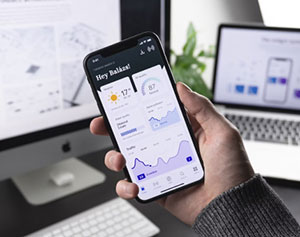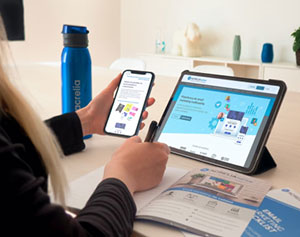4 Data Decisions That Build B2B Customer Trust and Loyalty

Blog post By Paula Chiocchi on 2023-03-22
Trust. It’s hard to build but easy to break, and a critical component of any business relationship.
A Harvard Business Review (HBR) article highlights research that points to financial repercussions or rewards based on whether a business has low or high customer trust. It also notes that "trust in business and institutions has plummeted to its lowest point in decades."
So how can you build trust with your customers and prospective customers?
To start, think about what trust means. Qualtrics defines brand trust as “the confidence that customers have in your brand’s ability to deliver on what it promises.”
The HBR article identified four essential factors of trust: humanity and transparency (together, they communicate intent) and capability and reliability (together, they demonstrate competence). By expressing empathy and kindness (the 'humanity' of a business), companies can show their customers that there are real people behind the business and that they are committed to fair treatment.
Transparency is essential -- customers appreciate businesses that are open and honest about their intentions, motives, and decision-making processes. Customers have a simple ask: they want the companies they do business with to provide products or services that meet their expectations. Finally, reliability is crucial, as customers demand that companies deliver on their promises -- consistently and reliably. Trust is earned when all of these factors are present.
As the Qualtrics article notes, trust can be a “vital differentiation” between a customer choosing your company over a competitor’s. Trust drives customer loyalty and advocacy. HBR found that customers “who give a brand high trust scores are three times more likely to stick with it through a mistake.” Up to 88% say they’re more likely to buy from that brand again, and 62% will buy from it almost exclusively.
When customers trust a brand, they are more likely to recommend it to others. However, trust is fragile, and companies must work hard to maintain it.
Trust and Data
Because we live in a data-driven society, the data decisions you make as a business, including the data partnerships you form, can impact your B2B customer relationships. Here are four ways those decisions can make or break your ability to build customer trust and loyalty:
- Avoid serious consequences. Inaccurate or outdated marketing data can negatively impact your business. It creates waste, decreases ROI for your campaigns, and results in potential regulatory issues if the data violates privacy. Those regulatory issues can lead to fines, a suspension of marketing activities, and, more importantly, a loss of customer trust and even lost business. The simple truth is that decision-makers want to avoid doing business with companies they mistrust, especially when a lot is at stake.
- Eliminate data disconnects. As consumers, we experience data disconnects almost daily as we shop online or engage with brands. It’s a big turn-off. And just like in B2C, accurate contact data in the B2B world is necessary for connecting with the right people at the right time with the right message. If you’re leveraging third-party data for customer acquisition purposes—whether to build an audience from scratch or augment the data you already have—it’s crucial to use high-quality data, not just to reach the right decision-makers for your offers but also to make a positive first impression, which is essential to building trust.
- Invest in understanding your customers. Using trusted third-party marketing data allows you to gain valuable insights, such as identifying key trends or patterns in B2B customer behavior that can better inform marketing strategies and tactics. As a result, your customers will see that you’ve invested in the capability to understand their wants, needs, challenges, and preferences, which builds trust.
- Support the buying journey. Quality data plays a critical role in helping your business establish a strong reputation. By using accurate and relevant data in your marketing efforts, you can provide prospects with more relevant content to support the buying journey. This level of personalization shows you really do “know” them and want to serve them effectively.
At OMI, we have always understood the importance of customer trust and loyalty. We trust the quality of our data so much that we guarantee 95% email validity for 30 days. Contact my team to learn more about this guarantee and our database of more than 117 million B2B contacts with validated email addresses.
OMI’s high-quality B2B business contact data is used by Fortune 1000 firms and start-ups alike to drive modern digital marketing initiatives—from intent monitoring and ABM to email marketing and omnichannel campaigns utilizing display, social media, and more. Reach out to our team today for more information.
DOWNLOAD YOUR FREE ebook
At OMI, we believe good things happen when you share your knowledge. That's why we're proud to educate marketers at every level - in every size and type of organization - about the basics of email marketing and the contact data that powers it.
-
The Executive's 15-Minute Guide to Building a Successful Email Marketing Database
-
A 15-Minute Guide to Fortune 2,000 Businesses and Executives
-
Five Best Practices for Using Email Marketing to Target SMBs



